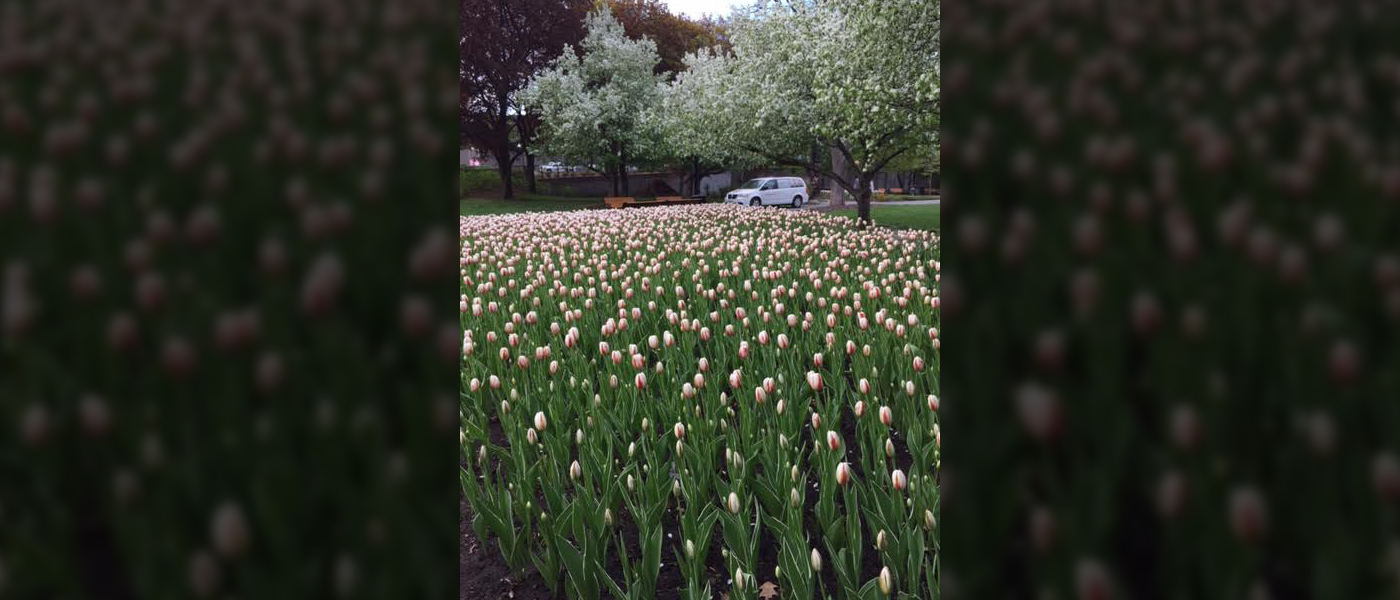Vintage record pressing machines are being de-mothballed and restored to working order and new businesses are being built around them. One such enterprise is near my home town of Portland, OR – in the less-expensive suburb of Milwaukee. Cascade Record Pressing, founded 2014.
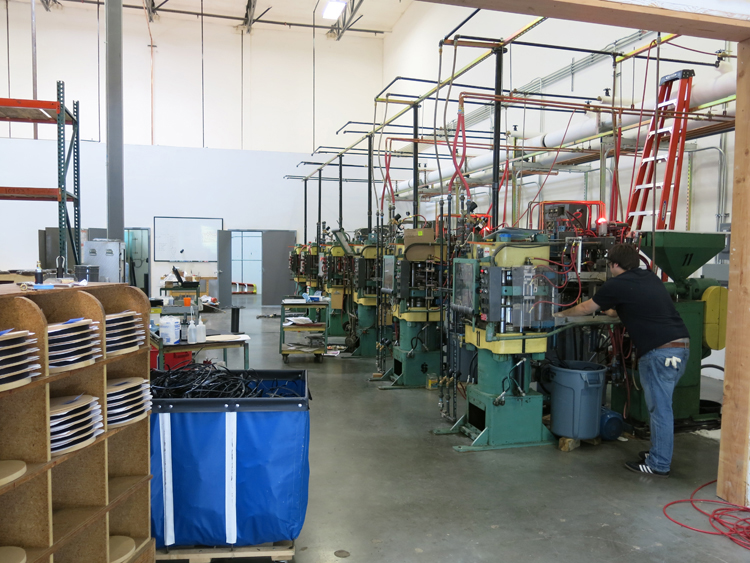
I paid them a visit a few months ago, relying on my iPhone to navigate to an office park completely obscured by trees, on an off-the-main-drag sort of road. Parked in front were a couple of meticulously maintained classic cars, a 280Z and a 1959 c10 GMC Pickup. Inside, after passing through a rudimentary office space, I saw the six pressing machines that form the heart of the operation. When Steve Lanning and Mark Rainey had the idea to start making records they knew they weren’t the only ones thinking along these lines. The vinyl record resurgence had created a huge backlog at the few plants that were still operating so they kept their search for used pressing machines on the down-low. They eventually rescued six automated presses from storage in Montreal, Canada. The machines were previously used by RIP-V records but have been mothballed since 2007. The machines have doubled in value since their acquisition by Cascade.
Secrets Sponsor
At the time of my visit only two of the six machines were operating. I thought that some of them might have been purchased for parts to keep the others running. That is not the case. It turns out that the firm that manufactures parts for record making equipment has never stopped production. Besides, Portland is rich with the ability to machine custom parts if needed – a local bonus that Cascade has already exploited. Expectations were for all six to be operating within a couple of weeks after my visit. The man responsible for making that happen is Jeff Truhn. Before Cascade, Jeff worked as motorcycle mechanic for 20 years. He was looking for a new outlet for his ingenuity and I think he found it.
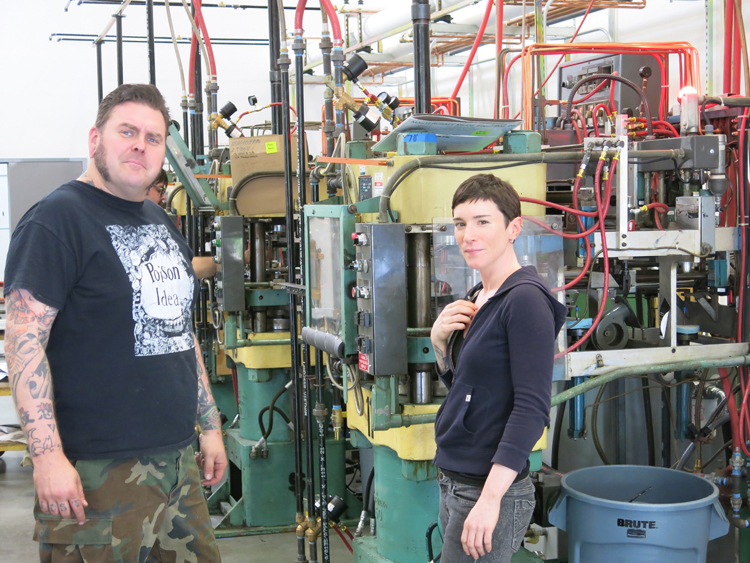
The machines are a noisy, oily affair. This is not the glamorous part of the record business. During my visit co-president Mark Rainey was busy putting records into sleeves and then crates. Fine job for a president but I had questions:
You were the founder of TKO Records, why get into the manufacturing end? “Bands were facing a wait of up to 18 months for their chance to use the presses – this is really unmanageable. For many bands, this sort of delay would mean that the tour is over and they’ve recorded the next album just as they are receiving the vinyl from the last.” As a long time vinyl nut I felt the pain of this through the 2000’s. New records would come out on CD and no one knew when (if ever) it would be available on the better format.
During those dark years only a small handful of record plants were still operating. Rainbo Records in Los Angeles was one of them and a visit to their website shows that the pressure on manufacturers is not yet relieved, at the top of their site: “TO ALL VINYL CUSTOMERS: Vinyl production is in high demand worldwide so please plan your releases well in advance!” Since Cascade is still starting up, bands can get some quicker service there (presently only about four months turn-around time) but the word is getting out.
In hopes of keeping up with demand Cascade is planning to avoid a surprising source of added pressure: Record Store Day. The orders for the one-day fest come in the months before the big day, often from major labels and bands. These orders interrupt the production schedule for those who are capable of planning ahead and force the teams at record plants to work till all hours in order to meet the schedule. Records for Record Store Day can’t really arrive a week late.
OK, next questions: Why are records sometimes warped? Why do I have to clean them? How in the name of god’s green earth could I take a record out of its sleeve and find it scratched??? TELL ME!
Amy Dragon, assistant manager, soothed my nerves, “We are all fans of vinyl and are severely bummed when we buy a record and find it has issues” Especially when we’ve forked over $30.” Ok, I was amongst my people. Mark offered sympathy and reassured me that they are doing multiple levels of QC.
Why (dusty, possibly abrasive) paper sleeves? : Well they are so much cheaper than plastic but don’t blame the pressing plant. It’s up to the record company or band. Even at 25 cents, a plastic sleeve seems like a small part of a $30 record but I know bands are only seeing a fraction of that, and then they are dividing the money amongst the band members. Cascade did shop for acid-free paper that seems to treat the record well.
Secrets Sponsor
Why is it up to buyers to clean the records, couldn’t it be done better at the factory? Mark hadn’t thought of this, his first thought (rightly so) was that it would be ridiculously expensive (time and money) to clean each record. Point taken, as I was asking this question I was keeping the president from his assigned duty of putting the records into the sleeves and boxing them up. But, let’s discuss this: It would be straightforward to build a machine that cleans multiple records at once. I think there are some instructions for DIY versions suitable for home use out there on the interweb. So sure, to build a machine that would be suitable for industrial use would be expensive and require much maintenance. But the upside is huge. The dirt, manufacturing gunk, I don’t know what, that comes in the grooves of even new records must receive a lot of blame for how people perceived vinyl back in the day. The jump to CD’s might have been a more hesitant step had people not been so tired of hearing clicks and pops on newly purchased records. Just sayin’.
Cleaning or no, there is a focus on quality control at Cascade. Each record is inspected by hand and many are listened to. The main issues of concern for the visual inspection are obvious defects such as scratches or other marks but also cupping (where the entire record warps into a shallow bowl shape – I *hate* that) and the old favorite, warps. As I write this I’m listening to the new release by the Seattle band Kinski called 7 (or 8) on the Kill Rock Stars label. It has both cupping and a decent sized warp. Grrrr. Ok, it sounds fine but why should it have these issues?
Regarding the quality control, Cascade made a conscious choice to aim for mid-line turntable and playback gear – thinking that is the best fit to the most listeners. I think this makes sense from a mechanical quality point of view. One thing expensive turntables do (we hope) is track well, if a record is going to create tracking issues on lesser gear, better to find that out in QC. But another thing expensive playback rigs do (we hope) is sound as good as possible. Maybe Cascade will spring for a high end turntable at some point to also check that their records are achieving the most they can sonically.
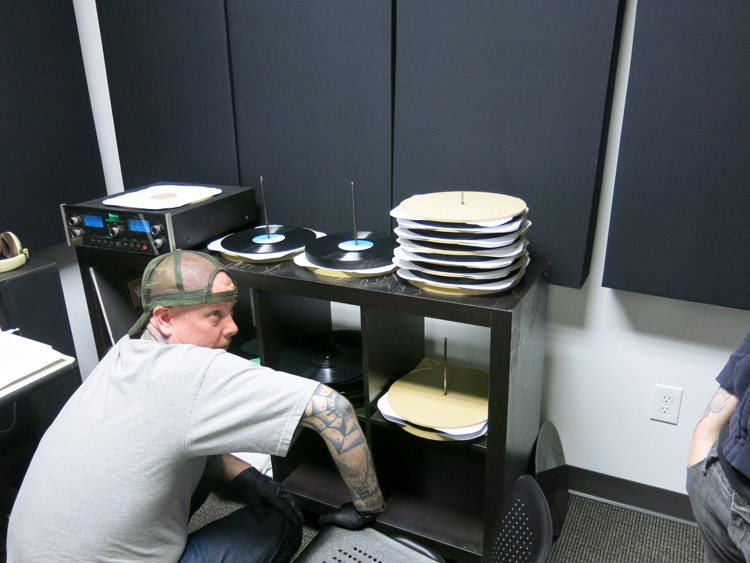
With all six machines running Cascade can produce up to 3000 records in an eight hour day. About one in 50 is expected to be scrapped by QC in a normal run.
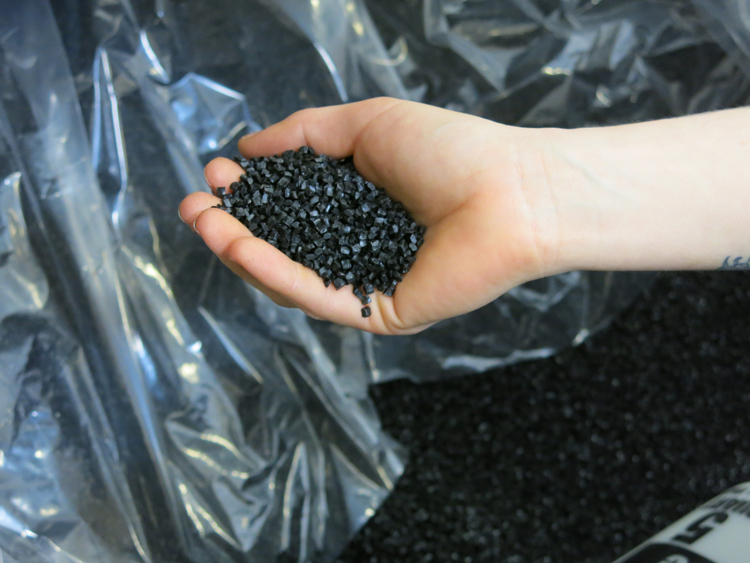
So far Cascade is making only 150g discs. Working on 180 – will require some new equipment and a month or so of learning and adjusting the machines for the new thickness. Records don’t just happen you know. Starting in the summer of 2016 Cascade will be making 7” records too thanks to a recent purchase of a 1970 SMT 3600 automatic 7" press. And as of 2016, newly manufactured record presses are available: NEWBILT (a Dutch and German enterprise) has updated the classic FINEBILT manual press. Jack white has ordered four pairs for his new pressing plant in Detroit. www.vinylrecordpresses.eu/our-products/ And Viryl Technologies (North America) will be offering their newly designed automatic presses for sale this year. www.viryltech.com
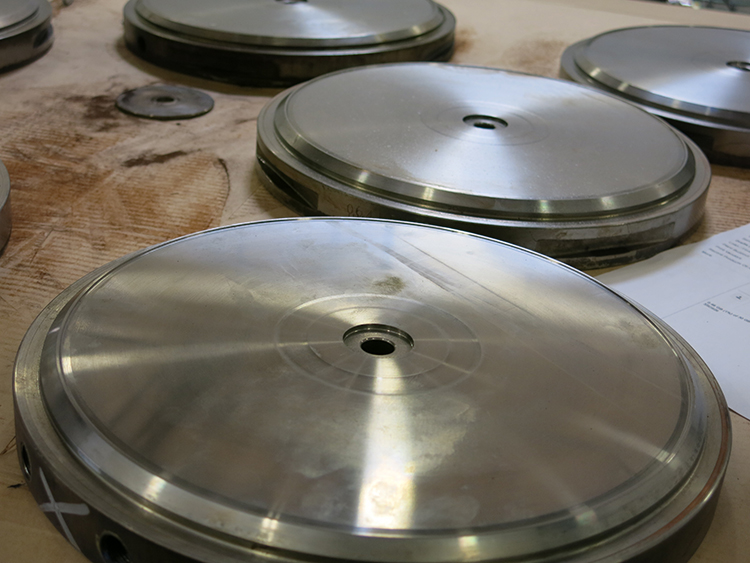
Yes vinyl is alive and well. At the time of this writing Cascade has 15 full time employees (and co-president Mark Rainey is no longer working the assembly station). With each trip I take to my local record shop (Music Millenium in Portland, OR) the vinyl side of the store is more and more crowded, even with young people (yay!) and the CD side less and less. The CD portion of the store still occupies the majority of space, about 70/30, but I wonder for how long.
Next up: An interview with Cascade co-founder and final-mix master Adam Gonsalves.


